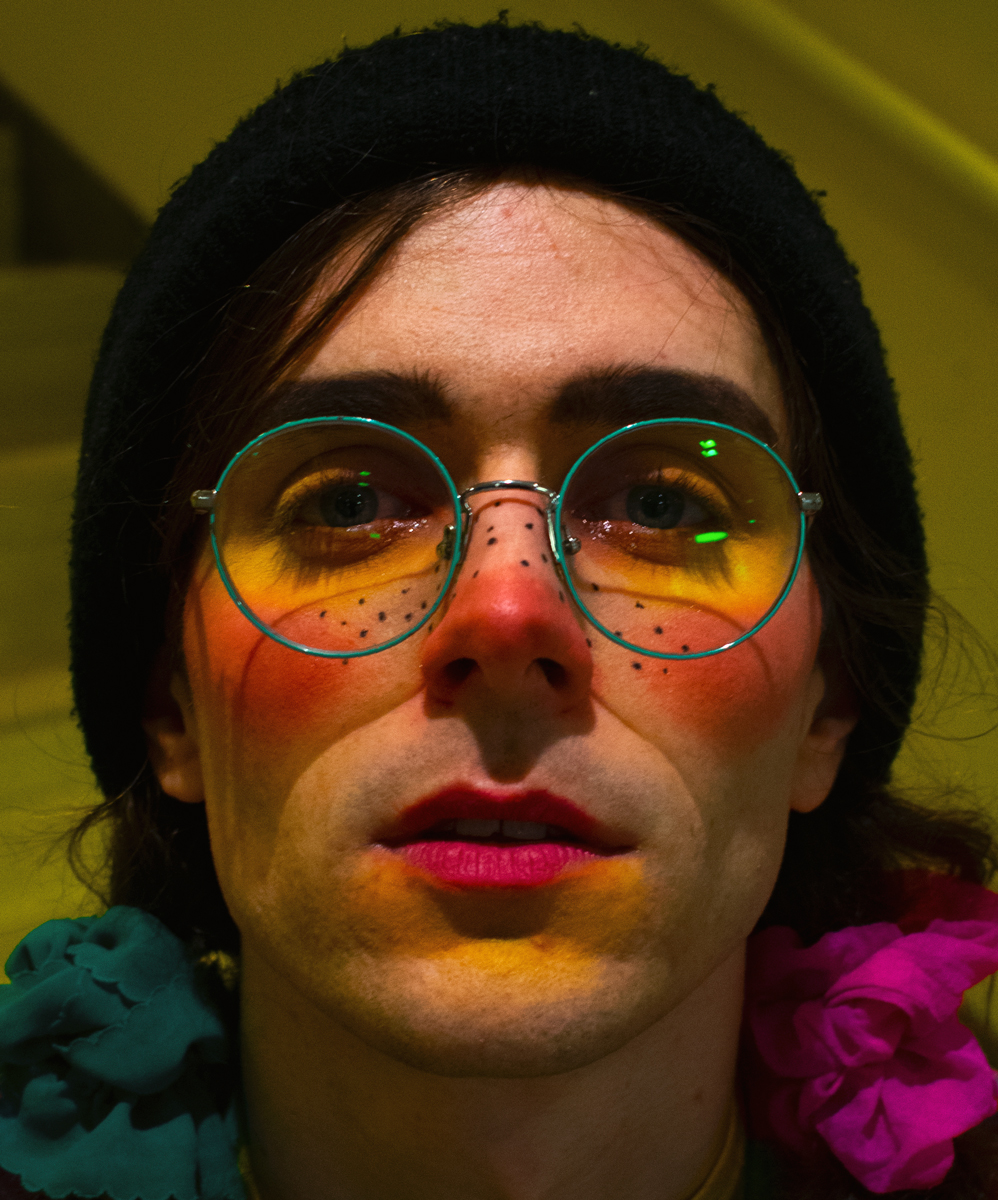They glided in the cafe on a unicycle.
A sense of opportunism mixed with a heavy, wistful wonder struck me throughout our conversation. Daffodil is a non-binary, game developing artist who moonlights as an activist for climate and animal justice in Vancouver.
Their work is translated throughout a variety of mediums; whether it be programming through a screen, digitizing art or painting a canvas on paper and on their skin. daffodil finds vehicles for artistic expression not only in their appearance, but the way they move around — on their unicycle.
M: How did you discover unicycling?
d: So, the first time I encountered unicycles, I was in high school and there was this costume contest for Halloween where someone had dressed up as Major Bedhead from the Canadian television show The Big Comfy Couch. So yeah, someone dressed up as the mail delivering clown Major Bedhead and rode on stage on a unicycle. And I thought it was so cool and was like, “I wanna try that sometime..”. I asked for a unicycle for my birthday and ended up getting one. And that was like 12 years ago-ish.
M: Why extreme street unicycling?
d: It’s a way of creatively expressing myself through movement, for myself. Because I have an appreciation for dance and performance art, and all that kind of stuff, but also personal development. I also have this thing — skateboarders probably know what I’m talking about — like street goggles, I guess? Now that I’ve built up a set of skills I can use in different configurations of public space, I start seeing the potential ways of engaging with it no matter where I go. Regardless of whether or not I’m consciously looking for it. Like I’ll see a ledge and be like, “oh I bet I could jump off of that in a particular way,” or see some piece of a structure connected to a fountain or something, and try to figure out how to move over or through it. To cap it off — unicycling specifically because skateboarding is hard. You probably think unicycling is hard, but I’ve been doing it for so long now that it feels safer, and I feel like I have more tools to express myself than with other extreme sports I’ve tried. It started as a desire to do cool stuff with an arbitrary extension of my body’s mode of transportation, but then it became impulsive.
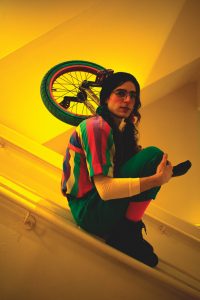
M: Do you consider yourself an art activist?
d: You say “art activist” but to some extent I feel like art is inseparable from life. There’s not a point where I decide “I’m doing art now.” Art is the residue of being, in a way. We be in the world, and we leave some stuff behind, through the way that we be, and that’s where the art is, I guess.
And in terms of the way I exist in the world, I’ve been engaging with climate activism and animal justice in Vancouver for a few years now, particularly with Extinction Rebellion. I always try to bring my unicycle when I go to those events to keep it kind of playful, jovial and festive. So that we can foster a sense of positivity through the frustration, intention and anger that we’re wielding to combat these systemic issues. And through that, stepping up when I can — when I know that I’m safe. I was arrested in, I think it was… October? During a climate protest on the Burrard bridge, and yeah, it seems to me that, […] in Canada at least[…], we have so much less to lose putting ourselves in the way of the systems of oppression.”
Art can be a reaction, or a means of existence. The change that daffodil illustrates, codes and composes through their work closes the gaps and spaces we seek to fill. With noise that speaks to us in languages that are fluid.
d: I make a lot of different music. I’m inspired by vaporwave and plunderphonics, kind of darker stuff. A lot of the time I’m taking samples of other tracks and cutting them up and rearranging them, modulating their pitch to turn them into constituent aural building blocks. They turn out to be these dark, looming, strange atmospheres.
M: Do you feel more attuned with darkness?
I tend to immerse myself in more music and media that evokes the emotions we often don’t want to confront in society. My favourite movies and albums of all time are ones that make me feel sad, or heavy, or evoke some sort of emotional response beyond pleasant, smooth riding. And that makes it way into my music and even into some of my games and other art I create. It’s what comes out. It’s what needs to be said, and we live in a dark time. It’s constantly weighing on me. In a way, putting that into my music, and in my other work, helps me deal with these emotions that we’re so afraid of taking over so we repress them instead of engaging.
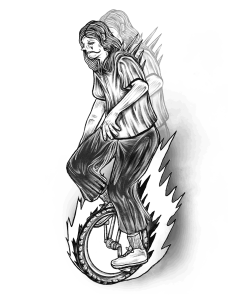
Their game, STREET UNI X tackles stereotypical extreme sport video game tropes while still staying true to the essence of the culture. A certain authenticity that is built in resistance, and the adrenaline of the sport.
d: My game is an extreme sports game. Historically, these games have had this edgy culture that tends towards not representing women, for example, very fairly. There’s these extreme sports games — that I love the game mechanics and the level design — but some of the characters are absurd scantily clad women. Some of the goals in the game are not great representations of people, other than the skateboarders.
To some extent in my games, and with STREET UNI X, I’m trying to subvert the tropes of machismo and bro culture that come along with extreme sports attitude. I’m trying to demarry them so we can all be extreme, and we can all do cool stunts with attitude, ya know? And through that I’m trying to get more diverse character representation. Like, there are going to be men and women and non-binary people as playable characters in the game.
Play is crafted through tricks that make diagonal connections towards communities which aren’t as visible in the streets that Vancouver seeks to pave. daffodil finds a happy home within game developing because of the freedom it gives them, and the player to experience.
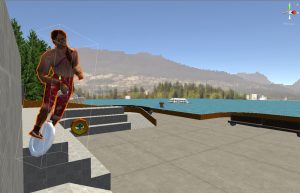 M: How is video-game developing different from other forms of art-making?
M: How is video-game developing different from other forms of art-making?
d: The unique aspect of video games is that every player’s experience is different and changed from another players — or even different from their own previous experience. It’s always changing. Always in flux.
In terms of art making, I feel like video games are great because you can be working on one aspect that kind of encompasses one form of media, like maybe visual art through texturing virtual spaces, or 3-D modelling virtual objects. But then, if I get kind of tired of doing that, within the same project I can redirect myself into a different form of media; through music, sound, animation, storytelling or poetry even. This media — this medium of video games — is a kind of culmination of all kinds of art making throughout history into a multimedia amorphous blob of totalizing creativity. And then, in terms of the players experience, video games have the unique component of a real intimate engagement with the work. Whereas most other work we’re passive listeners, or viewers. Like, when you see the painting, you don’t put your hands in the painting and move the paint around — the painting is as it is. It’s like a snapshot of a particular moment. Or a fixed linear series of snapshots in the form of cinema, or music. But in games you’re given a system of expression that has a realm of possibilities from the player’s perspective. Your experience versus my experience of any game will be totally different, and we can talk about our time playing them and have completely different understandings of what we did, how we did it, and why we did it. We’re like actors within the game world, in a way.
M: What are you most excited for people to see about the game? 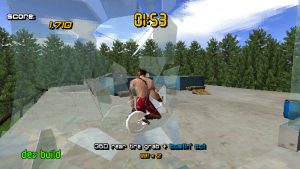
d: I’m excited for people to learn about street unicycling and to see that “Oh, unicycling isn’t just this silly thing for clowns to juggle on.” It’s a serious, kind of… pretty cool, extreme sport with a whole spectrum and vocabulary of expression that they may not have been aware of before. And through the game I can give people some feeling of what it’s like to do these tricks in real life, maybe inspire some people to unicycle. But also just inspire people to play more of these kinds of games because they’re super fun and I want more of them.
daffodil’s world is malleable; the roots of their perennial growth disrupts stagnant patterns of culture that move at a horizontal pace. Everything around them morphs into an ever-changing landscape, where concrete structures, fountains and parks become a playground for potential. Where wheelies and 360 uni-spins lead the constant search for this essence of play. That shape-shifting feeling which defies gravitational laws, hunts for quiet maneuvers that embrace slanted paths and leaves our cursors floating just a little longer, before we click send.
x
You can download STREET UNI X at daff.space/street-uni-x . As well as their personal website daff.space for music, youtube and other work. You can also follow them on twitter at @daffodildil and @StreetUniX for updates on the game.


